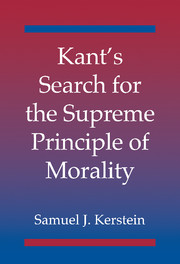Book contents
- Frontmatter
- Contents
- Acknowledgments
- Key to Abbreviations and Translations
- Introduction: Derivation, Deduction, and the Supreme Principle of Morality
- 1 Fundamental Concepts in Kant's Theory of Agency
- 2 Transcendental Freedom and the Derivation of the Formula of Universal Law
- 3 The Derivation of the Formula of Humanity
- 4 The Derivation of the Formula of Universal Law: A Criterial Reading
- 5 Criteria for the Supreme Principle of Morality
- 6 Duty and Moral Worth
- 7 Eliminating Rivals to the Categorical Imperative
- 8 Conclusion: Kant's Candidates for the Supreme Principle of Morality
- Notes
- Index
7 - Eliminating Rivals to the Categorical Imperative
Published online by Cambridge University Press: 06 September 2009
- Frontmatter
- Contents
- Acknowledgments
- Key to Abbreviations and Translations
- Introduction: Derivation, Deduction, and the Supreme Principle of Morality
- 1 Fundamental Concepts in Kant's Theory of Agency
- 2 Transcendental Freedom and the Derivation of the Formula of Universal Law
- 3 The Derivation of the Formula of Humanity
- 4 The Derivation of the Formula of Universal Law: A Criterial Reading
- 5 Criteria for the Supreme Principle of Morality
- 6 Duty and Moral Worth
- 7 Eliminating Rivals to the Categorical Imperative
- 8 Conclusion: Kant's Candidates for the Supreme Principle of Morality
- Notes
- Index
Summary
Aims of the Discussion
On the criterial reading, Kant's derivation of the Formula of Universal Law has three main steps. First, Kant tries to pinpoint the features that we, on reflection, believe that the supreme principle of morality must possess. Next, Kant attempts to establish that no possible rival to the Formula of Universal Law fulfills all of these criteria. Third, Kant tries to demonstrate that the Formula of Universal Law remains as a viable candidate for a principle that fulfills all of them. The third step is discussed in Chapter 8.
The current chapter concentrates on the second: how does (or might) Kant try to eliminate all possible rivals to the Formula of Universal Law? To succeed, Kant would need to prove that no possible rival possesses all of the necessary features of the supreme principle of morality that he has identified. It is doubtful that Kant could do so definitively, for it is hard to see how he could demonstrate that he had actually considered every alternative to the Formula of Universal Law. Nevertheless, if we accept Kant's view of the features that the supreme principle of morality would have to possess, then his argument by elimination has some force. For it does show that certain rivals to the Formula of Universal Law fail to be viable candidates for the supreme principle of morality.
- Type
- Chapter
- Information
- Kant's Search for the Supreme Principle of Morality , pp. 139 - 159Publisher: Cambridge University PressPrint publication year: 2002



